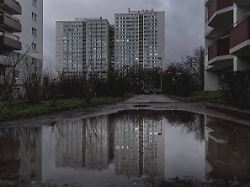Job centers pay horrendous rents
Germany lacks 910,000 social housing units
January 16, 2024, 1:23 p.m
Listen to article
This audio version was artificially generated. More info | Send feedback
According to a study, the situation in social housing is dramatic, with hundreds of thousands of accommodations missing. In places where there are hardly any cheap alternatives, job centers sometimes pay horrendous rents. This results in massive additional costs.
According to a study, there is a lack of 910,000 social housing units in Germany. The federal and state governments have massively neglected the promotion of such residential units, explained an alliance of tenants’ association and construction union IG BAU as well as social and industry associations. The study by the Pestel Institute in Hanover shows that in particularly tight housing markets where there is a lack of affordable alternatives, the state pays rents that are significantly above average when covering the costs of accommodation.
The “Social Housing” alliance reiterated its call for a 50 billion euro package from the federal and state governments to promote social housing. This is the only way to “get at least a little closer” to the traffic light coalition’s goal of building 100,000 new social housing units per year.
“In order to make it possible for needy households to live at all, the state is now forced to accept steadily rising rents on the free housing market,” said study leader Matthias Günther from the Pestel Institute. The public sector pays rents that are often significantly higher than the average rent. “As a result, the necessary government spending on housing benefit and accommodation costs has exploded.” In the end, it is primarily the landlords who benefit from this, criticized Günther.
Job centers in Munich pay 19.20 euros per square meter
According to the study, Munich is the front runner. Here, the rent paid by the job centers and the cost of accommodation at 19.20 euros per square meter was around 6.40 euros – and therefore exactly 50 percent – above the average rent in Munich. The bottom line is that the state is already paying millions in “extra rent” every month in Munich alone.
Nationwide, the study calculates around 700 million euros in additional costs per year in the cost of accommodation alone compared to the average rent. According to the scientists, the state spent a total of more than 20 billion euros in social spending for the first time in 2023 to support people in need with housing: a good 15 billion euros for the costs of accommodation, which are mainly paid by the job centers, and over five billion euros for housing benefit .
In contrast, federal and state spending on social housing in recent years has only been less than 2.5 billion euros per year, according to the study. “The social spending on housing is eight times as high as the funding for the construction of new social housing,” said Günther. The main reason for the “clear disparity” is the federal government’s long-standing mismanagement. “Until recently, he reduced social housing construction – i.e. property subsidies – to a minimum and thus provoked drastically increasing expenditure on the costs of accommodation and for housing benefit – i.e. for subject subsidies.”
